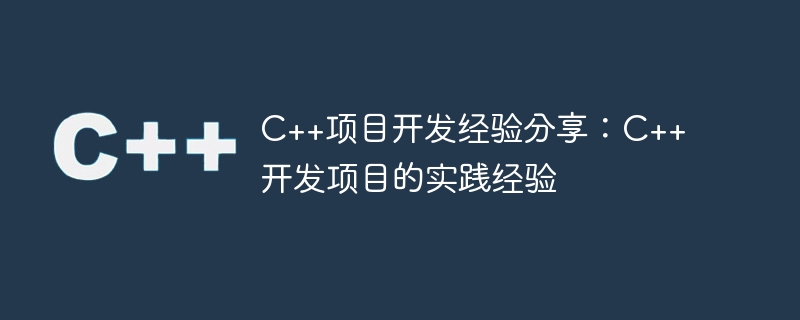

C is a programming language that is particularly suitable for developing high-performance and complex applications. As a C developer, I have been fortunate enough to participate in the development of multiple C projects and have accumulated some valuable practical experience. In this article, I would like to share some experiences and tips about C project development.
First of all, a successful C project requires good architectural design. Before a project begins, think carefully about the needs and goals of the project and design a clear architecture around those needs and goals. A good architecture should be modular, scalable and maintainable. Follow the single responsibility principle and ensure that each module is only responsible for one specific function. At the same time, attention should be paid to the dependencies between modules to avoid being too tightly coupled.
Secondly, pay attention to code quality and readability. C is a strongly typed static language that has high requirements on code correctness. When writing code, strictly follow coding standards and conduct adequate testing. Using meaningful variable and function names and writing clear and understandable comments can improve the readability and maintainability of your code. In addition, try to avoid using global variables and magic numbers, use object-oriented design ideas, and encapsulate data and behavior in classes.
The third point is to rationally use C features and library functions. C is a powerful language with a rich set of features and library functions. Proficiency in these features and functions can improve development efficiency and reduce the risk of bugs. For example, you can use the containers and algorithms provided by STL to simplify the implementation of data structures and algorithms; use C templates and generic programming ideas to implement universal codes; use smart pointers and RAII technology to manage the life cycle of resources, etc.
In addition, pay attention to memory management and performance optimization in C. C allows direct memory management, but is also prone to memory leaks or dangling pointers. Therefore, when using pointers and dynamically allocating memory, special attention should be paid to the release and recycling of memory. Smart pointers can be used to avoid manual memory management. Additionally, an important aspect of C performance optimization is reducing unnecessary copies and memory allocations. You can use reference and move semantics to reduce copy overhead, and use object pools to avoid frequent memory allocation and release.
Finally, continue to learn and improve your technical capabilities. C is a large and complex programming language. Constantly learning and exploring new technologies and tools can help us better deal with various problems in the project. Participating in technical exchange activities, reading relevant books and blogs, and participating in contributions to open source projects are all effective ways to improve your technical capabilities.
Through my practical experience, I deeply understand the importance of good architectural design, high-quality code, reasonable use of C features, attention to memory management and performance optimization, and continuous learning and improvement of technical capabilities. . I hope that my experience sharing will inspire developers who are developing C projects and help them complete their work better. Only by continuous learning and improvement can we go further on the road of C project development.
The above is the detailed content of C++ project development experience sharing: Practical experience in C++ development projects. For more information, please follow other related articles on the PHP Chinese website!




